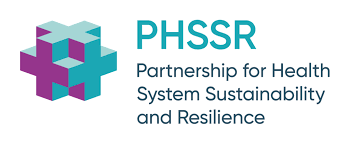تحت رعاية سموّ الشيخ خالد بن محمد بن زايد آل نهيان، ولي عهد أبوظبي رئيس المجلس التنفيذي لإمارة أبوظبي
Under the Patronage of His Highness Sheikh Khaled bin Mohamed bin Zayed Al Nahyan, Crown Prince of Abu Dhabi and Chairman of Abu Dhabi Executive Council
ACCELERATING THE FUTURE OF GLOBAL HEALTHCARE
AN ABU DHABI STRATEGIC INITIATIVE
How messiness, self-criticism and screens cause you to eat poorly
Although food is a necessity for all humans, how we eat typically varies significantly from person to person. And while our food preferences and dislikes help determine what we actually put into our mouths – which ultimately influences our health – more and more research points to lifestyle factors that can greatly affect both the quality and quantity of our diets.
Below are five lifestyle factors that can influence our eating habits, along with tricks on how to use them to improve your health.
Decluttering your kitchen
Having a messy, cluttered kitchen can lead to poor eating habits. It can also increase the likelihood of weight gain.
“Sometimes, you have intentions of eating healthy, but you can’t find where things are. … You have things on the counter, and so you eat what’s there … and you end up subconsciously eating more without realizing it,” said Lisa R. Young, registered dietitian nutritionist and author of “Finally Full, Finally Slim: 30 Days to Permanent Weight Loss One Portion at a Time.”
Clutter can mean lots of food options left out that grab your attention. “You have five different types of sugary cereals or five different types of ice cream,” Young said. And more options may mean more calories consumed. “When you have only one type of cookie around, you eat a few and then stop. But if you have five types of cookies, you will tend to want to try them all, so you eat more.”
A cluttered, chaotic kitchen can also make you feel stressed or like you’ve lost control, and that too could lead to overeating, Young explained.
On the flipside, being organized and tidy can allow us to have a healthier relationship with food and develop better eating habits. “You can keep healthy foods around, you feel organized, and you feel like you are approaching food from a place of power,” Young said.
One easy way to quickly declutter is to keep your countertops as you would your workspace: Take everything off and return only what’s necessary, Young recommends. Put all cereal and chips away, and conceal all candy in opaque containers; then place them in hard-to-reach places, like the top shelves of cabinets. And leave only fresh fruit on the counter.
Unplugging
Experts say that taking a break from technology can help keep you calm and less stressed, which might help reduce stress-related eating. Unplugging also allows your eating to be more mindful.
Distraction pulls you away from the present moment, which not only causes you to miss out on the taste and flavor of foods, it prevents you from registering when you are full, explained Megrette Fletcher, a registered dietitian nutritionist and co-founder of The Center for Mindful Eating, an international nonprofit whose mission is to help people achieve a balanced, respectful, healthy and joyful relationship with food and eating.
“You’re eating, the TV is going, the computer is on, and the phone rings. … My hunger is going down, and each subsequent bite is making me fuller, but am I noticing the change? Am I exiting eating when I’m comfortably full and satisfied?” Fletcher asked.
Young agreed: “People are eating and looking at their phone at the same time. They’re not paying attention, they’re not being in the moment, and sometimes just taking a break and disconnecting from a screen, from social media, from texting, can make you calmer.” Being more relaxed allows you to focus more on the foods you choose to eat.
According to one study that Young cites in her book, people who played a game of solitaire on a computer while eating ate faster, ate nearly twice as much and felt less full than people who were not distracted while eating.
Chronic distraction can carry over even when you are not on the screen. “It’s a lifestyle that can carry over into meals, even if you are not actually on a computer during a meal: You may have other things distracting you and taking you away from the moment of eating,” Young said.
When we are less distracted and more mindful, we’re fully tuned into our appetite, appreciate our food, note when we are satisfied and avoid eating impulsively.
Young recommends deciding what you need to disconnect from (social media, news, email, texting or anything with a screen) and then scheduling routine breaks, especially during meal times.
Getting a better night’s sleep
Research suggests that when we are chronically sleep-deprived, we eat more and are more likely to gain weight. And we’re not exactly gaining pounds from fruits and vegetables. “The research seems to show that sleep-deprived people crave comfort food: high-fat, high-sugar, high-calorie junk food,” Young said.
“Exactly what the link is, we’re not 100% sure, but the final result is that poor sleeping habits can be linked to obesity,” Young said. Not getting enough sleep is also linked with heart disease, Type 2 diabetes and depression.
Another piece of the sleep puzzle is that not getting enough Zs can negatively affect your mood, and if your mood is low, you may turn to unhealthy foods.
“My clients try to use food as a wake-me-up – and so they just eat to have more energy, and that means they’re getting more calories … but they’re eating a chocolate bar and a bag of chips,” Young said.
Although sleeping needs are individual, Young recommends a minimum of seven hours per night to avoid poor eating habits. To increase the likelihood of a good night’s sleep, Young recommends clearing your mind by meditating or writing down tomorrow’s to-do list. It’s also wise to avoid caffeine later in the day, and limit alcohol, which can affect the quality of your sleep.
Writing before biting
“Writing down what we eat can bring awareness and curiosity to our eating, and that is effective for creating healthy eating habits,” Fletcher said.
Young noted, “it’s the best behavioral modification trick around. You are registering what it is that you are eating so you are not eating mindlessly.”
When you don’t pay attention to what you eat, the calories can add up quickly: a few chips here and there, a couple of french fries off your kid’s plate, a few bites of a candy bar eaten on the run. On the flipside, writing down what you eat not only makes you aware of your food choices, it can be a deterrent from eating fatty foods and desserts. “Clients will say, ‘I knew I had to write down the double scoop of mint chocolate chip ice cream cone, so I said I’m not going to eat it,’ ” Young said.
Writing down what you plan to eat in advance of meals can give you an extra boost, because you are more likely to choose healthier foods. But food journaling in real time can be just as helpful, because it can allow you to make better choices later in the day, depending on what you just ate.
Reflecting on a weekly journal can be beneficial, as well. “After a couple of days, you can see, ‘I’m eating way too many starches and not enough fruits and vegetables.’ You have the knowledge to improve,” Young said.
But if journaling seems laborious, consider this: You don’t need to do it 24/7.
“Even if you don’t want to write everything down, just write down your ‘cheat meals’ or what you ate at the restaurant,” Young said. Apps and online journals like MyFitnessPal or Lose it! can also make recording what you eat less time-consuming.
Practicing self-compassion
Practicing self-compassion is eating in a way that reflects self-value and self-regard, Fletcher explained. That can mean considering time to eat breakfast or simply giving ourselves permission to eat the foods we love.
Our internal dialogue can be critical or compassionate. A compassionate view might be approaching the desire to eat pizza in a nonjudgmental way. “You might say, ‘I want pizza. … How can I include pizza and nourish my body?’ ” Fletcher explained.
Young advised, “when you don’t practice self-compassion, if you eat an ice cream cone or one brownie or one cookie, you think, ‘I screwed up. I’m never going to be thin. I’m never going to be healthy.’ It’s black and white thinking, and that can never be good.”
What’s more, the negative internal dialogue from a one-time “slip” can cause you to make poor food choices at future meals and snack opportunities, which can truly sabotage your eating habits.
“You want to embrace your whole self. You are a person, an individual, and you are not good or bad depending on what you ate. And when you practice self-compassion, you give yourself more wiggle room to make better choices down the road,” Young said.
One study found that people who practiced self-compassion after they ate a doughnut ate less later on compared with those who weren’t as kind to themselves.
Experts say that being kind and gentle with ourselves offers many other psychological benefits, in addition to establishing a healthy relationship with food.
But don’t get frustrated if self-compassion doesn’t come easy or naturally. “You have to work on it. It’s a muscle you have to flex like everything else. But it’s important, and it’s powerful,” Young said.
Lisa Drayer is a nutritionist, an author and a CNN health and nutrition contributor.
Source: CNN






































